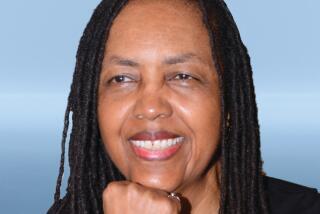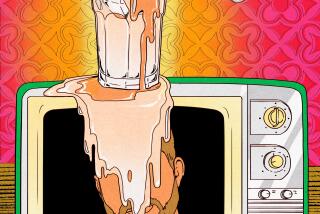Surviving Injustice to Cradle New Beginnings
- Share via
The day of Max Sussman’s birth began with brunch in Las Vegas and was followed by a weaving, all-out dash through the desert, which, in essence, was a matter of keeping up with the flow of weekend traffic on I-15.
“How would you feel if he was born in Baker?” Steve Sussman asked his wife, Rotchana.
“Keep going,” she said.
“Barstow?”
“Keep going.”
They arrived at Huntington Memorial Hospital in Pasadena by midafternoon, March 10, and Max arrived that evening at 6:50, three weeks early.
He was named after Steve’s father, Max Sussman, a man of wit and kindness who, even as he lay dying from lung cancer 30 years ago, had nurses laughing. Max is not short for Maxwell or anything else. Just Max.
He is a happy baby, not easily given to outbursts. He is a good eater, healthy and strong.
Max represents the dreams of many. When his parents hold him in their arms, they heal a bit. In his voice they hear, and in his eyes they see how injustice can be overcome and how hope can be powerfully restored.
In the mid-1990s, Rotchana, now 31, traveled from Thailand to the United States in hopes of a new start and was instead held captive in an El Monte sweatshop, sewing 18 or more hours a day, seven days a week, in a room with boarded windows and no air-conditioning or heat. When police came and freed the workers, they cheered as they were transported from the compound, surrounded by barbed wire. And, once again, Rotchana set out to find work so she could send money home as she had planned. In 1998, she met Steve. Even now, he finds it incredible how after suffering such injustice she can radiate such light upon his life.
Before meeting her, Steve, 46, thought it was too late for children; too late, in fact, for much of what he hoped for in life. He wanted a family of his own, a house of his own, and he wanted to feel secure in his work as a professor at USC. Somehow, it seemed, such dreams had passed him by. When he met Rotchana, he was on sabbatical leave, taking time off to examine his life. A 17-year relationship followed by a brief marriage had left him living alone in a small apartment in Pasadena. In important ways, his life seemed empty.
His desire for children extended back in time. His maternal grandparents, Jewish immigrants, worked in the garment industry sweatshops of Chicago before starting their own business. Throughout his life, he heard stories of struggle and tragedy, how his grandfather survived the Holocaust by hiding in a haystack, how others were marched into a river to drown or be executed.
He once added up the dead. “All told,” he says, “50% of my family were killed in the Holocaust.” Such horror caused him to see his life with a sense of urgency. Neither he nor his brother or sister ended up having children, and as he thought back to those who were killed, he felt a deepened sense of loss.
“There was the feeling,” he says, “of wanting to continue the family, living past the Holocaust.”
And so, now, he holds Max ever so tenderly as Rotchana looks on. The cradle of his arms is gentle but stiff, and there is a hint of uncertainty and caution as he lifts his son and holds him next to his heart.
Financial Ruin and a Family Left Behind
While still in her 20s, Rotchana, mother of two, had built a thriving construction supply business in Thailand. She also owned a barbershop and a farm with 80 pigs. She was able to buy land and, as the oldest of four children, help support her parents.
It all unraveled, however, in the early 1990s, when the economy crumbled and she lost everything. Desperate to pay her 86 employees and creditors what was owed them and determined to secure money for her children’s educations, she decided to leave the country to find work. She heard there was good money to be made in California. In three years, she figured, she could earn enough to pay off her debts, set aside money for her children’s educations and return to Thailand. She and her husband by an arranged marriage were separated at the time--later they would divorce.
When she boarded a flight from Bangkok to Los Angeles in 1994, she left her children, ages 2 and 3, with her parents. It would be 1999 before she saw them again.
Recruiters in Thailand for the sweatshop provided her with nice clothes and jewelry to wear on the airplane so she would look like a tourist to avoid drawing attention to the operation. Her hair was fixed, and she was given a passport and cash. Right after arriving at LAX, she was taken to the compound in El Monte, where everything was confiscated and she was put to work. She was paid $500 a month, but after money for food, bought from a store and sold to workers for double the price, and other expenses were taken out, there was little left to send home.
Mail was censored, but sometimes workers were allowed to receive tapes from their families. Over and over, they would listen to their children’s voices, reminding them of freedom and home. At night, Rotchana slept upstairs with the other workers on mats stuffed with scraps of fabric. Initially, they would laugh as they told stories of their children. Finally, they could no longer laugh, and silence set in. Sometimes late at night, when the others were asleep, Rotchana would go to the bathroom, turn on the water so she wouldn’t be heard, and cry. She suspected others did the same.
The workers were denied medical treatment, and one man, who could stand the pain no more, pulled three of his own teeth. To prevent escapes, workers were shown photographs of a man who had been beaten. This is what happens, they were told, to those who try to leave. When police raided the compound, Rotchana, thin and pale, was hiding in the closet. There was confusion, as law-enforcement officials rounded up more than 70 workers.
It was Rotchana who became their voice. She wanted to talk to an attorney. She wanted justice.
Seven of the sweatshop operators were imprisoned, while two fled and were never captured. The workers were awarded settlements from the clothing manufacturers. Rotchana received about $20,000, much of which went toward back surgery, necessitated by injuries from the work she was forced to do during her 16 months of captivity.
After her release, she continued working as a seamstress, cleaning houses on weekends and also working as a waitress. She felt she had failed, financially in Thailand and once again in America. She could not go home this way. “I didn’t want my family to be ashamed,” she says.
So she stayed and searched for ways to earn money. In 1998, she heard about a course on how to sell life insurance. She drove to Pasadena but couldn’t find the building where the class was held, so she stopped at a Ralphs supermarket to call a friend for directions.
When she turned around, she saw Steve. At the time he had a long, scraggly beard and was wearing blue jeans with holes in the knees. She thought he was homeless.
She showed him the address, and he gave her directions. He also gave her his telephone number and said that if she ever got lost again, she could call him. It was a small act of kindness at a moment when she felt lost and far away from all things important to her.
She called to thank him, and they began talking. Then one night, she invited him to a meeting addressing workers’ rights, in which she described her experiences in the sweatshop. He was taken by her strength and courage. They were married that same year. Rotchana had been trying desperately to get her children to America. After discovering that the process would be expedited if they were married in Thailand, Steve and Rotchana flew there and married again. In 1999, her daughter Guang, now 10, and son Evan, now 9, joined them in their new life.
The family lives in a house in the San Gabriel Valley with flowers in front and fruit trees in back. Steve is a now a tenured professor of psychology and preventive medicine. Rotchana would like to go to school someday and study English, writing and fashion design. She speaks excitedly of the future and does not dwell on her past.
She is helping her two older children adjust to a different country.
Then there is Max, whose middle name is Rian, after her father. He’s now up to 8 pounds. In time, he will hear the stories of strength, injustice and, in the end, triumph.
*
To share a milestone, large or small, e-mail duane.noriyuki@latimes.com or call (213) 237-0701.
More to Read
Sign up for Essential California
The most important California stories and recommendations in your inbox every morning.
You may occasionally receive promotional content from the Los Angeles Times.













